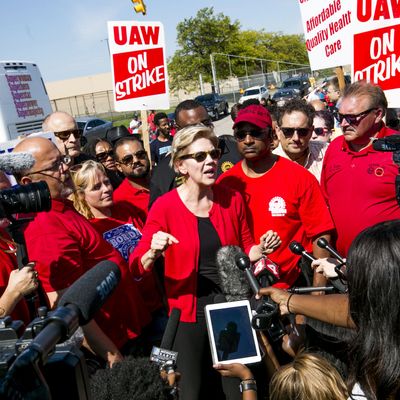
Despite all the attention that has been given to the competition (mostly between Bernie Sanders and Elizabeth Warren) for the love and support of progressive activists during the early stages of the 2020 Democratic presidential contest, there’s an arguably even more important struggle underway for labor movement backing. Yes, union ranks have been steadily diminished in recent decades, and unions have been subjected to a sustained and often successful campaign of demonization by employees, shadowy dark money groups, conservative ideologues and black-robed judicial cheerleaders for corporations. But as my colleague Sarah Jones has pointed out, labor is feeling its oats in 2020:
[L]abor is seizing its moment. In a Wednesday morning speech in Milwaukee, the president of the Service Employees International Union outlined sweeping expectations for candidates who want the union’s endorsement. Mary Kay Henry praised Democrats for releasing policy plans to raise taxes on corporations and the rich, but made it clear that those plans are an inadequate substitute for releasing detailed, union-specific proposals. “The wealthy will find a way to protect their wealth, often at any cost. That’s why we need to put working people in charge. Because when workers organize, we can make bigger change, and we can make it stick,” Henry told assembled workers.
She then called for remedies that would increase union power and raise the nation’s rates of union membership. SEIU, she said, expects candidate proposals to meet four basic standards. They should prioritize union membership as a way to reduce economic inequality, and call for sectoral bargaining, where workers employed by different companies in the same industry could bargain collectively for a universal contract. They should also urge states to treat federal labor law as a floor, and not a ceiling, for labor rights, and ensure that federal workers and contractors make at least $15 an hour and have a chance to form a union if they choose. “If candidates can’t commit to these four things, they can’t count on our support,” she said, “and let’s face it, these candidates need our support.”
It’s probably no coincidence that fast-rising candidate Elizabeth Warren released her latest “plan” focused on labor rights the day before SEIU’s pre-endorsement presidential forum. And Vox’s Alexia Fernandez Campbell adjudges it as the “most ambitious” of the campaign so far. It’s certainly the longest, weighing in at 14 pages, and clearly meeting all of SEIU’s criteria. Bernie Sanders anticipated Warren’s action in August with his own “Workplace Democracy Plan.” As Campbell says, though, Warren’s is more detail-oriented:
In many ways, Warren’s ideas mirror some of Sen. Bernie Sanders’s proposals, like making it easier for workers to go on strike and letting unions bargain on behalf of an entire industry. But Warren also focuses on the minutiae — the little tweaks and changes that could make a real difference for working Americans.
About a month ago Campbell also characterized the leading candidates as a whole as falling into two groups:
Reading the labor platforms for each of the 10 candidates who qualified for the third Democratic primary debate next week, two groups emerged: the labor reformers and the labor supporters. Most of the frontrunners fall into the first category — Beto O’Rourke, Buttigieg, and Sanders have all put out astonishingly detailed proposals that would shift the balance of power from businesses to workers. Joe Biden, Amy Klobuchar, and Andrew Yang are in the second group. They seem to see themselves more as allies to workers and labor unions than true change-makers.
More recently, veteran labor reporter Steven Greenhouse gave candidates letter grades for their labor proposals, with Sanders and Warren earning an A; Pete Buttigieg an A-minus; Joe Biden, Cory Booker, Julián Castro, Kamala Harris, and Beto O’Rourke a B; Amy Klobuchar a B-minus; and Andrew Yang a C+. (To provide context, Greenhouse awarded Donald Trump an F-plus). It’s interesting that in almost all assessments of the field, Warren rated well even before she issued her “plan” because of deep appreciation for her trade policy proposals, which some union officials told Greenhouse were “by far the best and most sophisticated they’ve ever seen from a lawmaker.” She had also made a mark earlier with her Accountable Capitalism Act, guaranteeing workers 40 percent of corporate board positions, and her early support for California’s new legislation restoring wage, benefit, and union rights to “gig economy” workers.
Whatever endorsements individual unions make (and most are being cautious this year after too many piled onto the Hillary Clinton bandwagon early in the 2016 cycle), their memberships have a host of concerns just like any other voters, including health care (e.g., Medicare for All, which some fervently embrace while others fear as disruptive of generous health plans won at the bargaining table), specific industry concerns related to energy and the environment, women’s and minority rights, and of course electability. Any of the Democrats would be considered far superior to Trump and the party he leads. It’s notable that the pol most often singled out as representing the GOP’s bright and diverse post-Trump future, Nikki Haley, once told corporate investors they weren’t welcome in South Carolina if they brought along “union jobs.” Now more than ever, presidential general elections are a holy war for the labor movement, and its organizational muscle and enthusiasm will be valued assets for the eventual Democratic nominee.






























